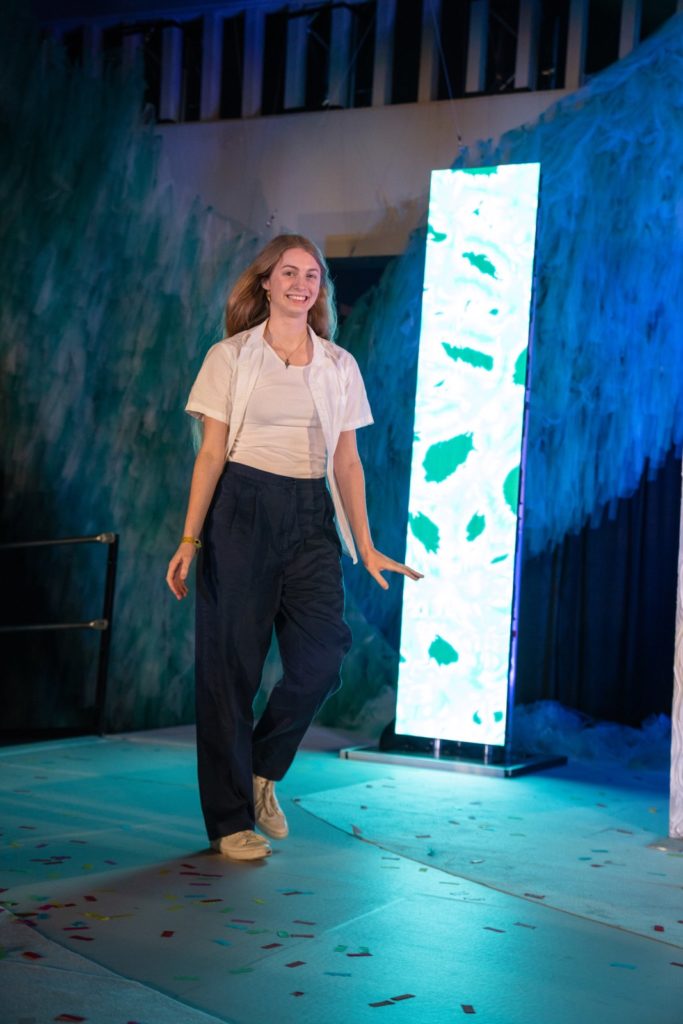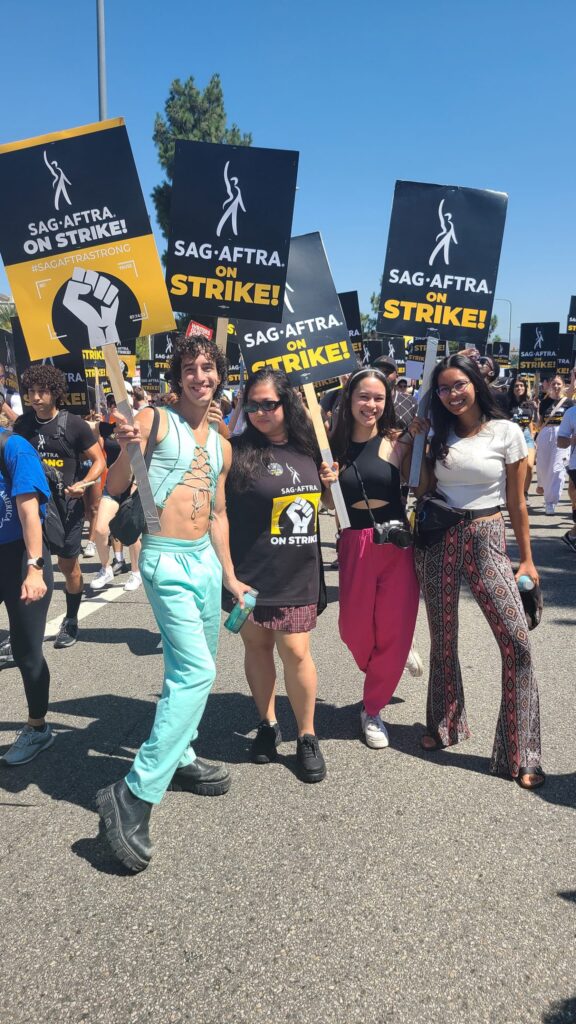Over the last four years, graduates from CalArts’ School of Theater have faced many uncertainties. Some graduated into a global pandemic that’s made lasting impacts on the entertainment and art world. The class of 2023—my class—has entered that world amid a strike that’s brought much of Hollywood to a standstill.
For the first time since 1960, both the Writers Guild of America (WGA) and the Screen Actors Guild – American Federation of Television and Radio Artists (SAG-AFTRA) have taken to the streets to protest the Alliance of Motion Picture and Television Producers (AMPTP). The WGA has been on strike since May to fight for residuals from streaming shows, better contracts, and not being replaced by AI in the writers’ rooms.
SAG-AFTRA joined in July after negotiations between them and the AMPTP failed to create a contract that addressed actors’ concerns about pay structures, AI, self-tapes, workplace conditions, and other issues.
But what do these strikes mean for recent graduates? Although it may not be the industry they expected to enter upon graduation, CalArts School of Theater graduates have found new ways to be creative and survive during this time. I’ve talked to a number of alums and found resilience and ingenuity—backed by a strong solidarity with the strike despite the uncertainties that come with it.
As a 2023 graduate of the Acting Program, the industry I find myself in is one of both confusion and inspiration. Even though many of us are not SAG-AFTRA members yet, my friends and I have been supporting the strike at the picket lines because we know that striking and protesting are crucial methods for creating change. Just like social justice and labor movements from our history, striking brings attention to core issues of how we function as an industry and society.

The decisions we make and the conditions we create right now will be our future in the art and entertainment world. As creatives, we are the people bringing stories and joy to people’s homes and lives. What the striking workers are asking for is just the minimum. The AMPTP has said they will draw this strike out until actors and writers are on the streets. Instead, as seen in some of the strikes I have been to, actors and writers are literally taking over the streets with our signs and solidarity.
In the meantime, we can use this period to build artistic communities, develop our own content, and reconnect with other creative aspects of our lives. While work through the SAG-AFTRA TV-Theatrical agreement is on pause, I’ve delved into the world of voiceover and returned to dance with the Dancing Storytellers, bringing Indian stories and dance traditions to schools, museums, and libraries throughout Los Angeles and Orange County.
Many other recent graduates from the School of Theater have echoed the importance of the strike and shared how they have been using this time to develop their creativity. A few of their stories follow.
Jes Vesconte (Theater BFA 20), an actor, Fulbright scholar, and climate activist, pointed out that the strikes have brought attention to a resurgent labor movement that is larger than just the entertainment world. To them, the strikes show that “organized labor is a real threat to oppressive labor structures” and the fact that actors are striking brings attention and involvement from those who may not have been aware of the labor movement before.
“I was talking to Daniel Kwan, the director of Everything Everywhere All At Once, that labor is one of the only tools we have to beat the climate crisis,” Vesconte said. “It is one of the only ways to have real leverage over the state because obviously, the state has us outgunned and outmanned in every other situation. But striking allows us to take economic leverage. It’s very anticapitalist and that’s great.”

This feeling of hope for a better future is something that resonates with many graduates. Noah Hernandez (Theater BFA 22) said he is inspired by the awareness and coverage of the strikes and hopes that this brings conversation to the ethics of other creative industries as well.
“I see this as being the beginning of a much larger fight—one that promises a future of respect and integrity for all artistic communities.”
As a designer, he said that the strikes “barely scratch the surface of the issues production teams face on the regular.”
“With the way media is evolving, I think it is as important as ever that creatives are given their fair share of residuals, ownership of their own likeness, and honoring humane timelines/schedules. Major corporations have grossly taken advantage of these systems that misrepresent and undervalue this hardworking community.”
Another recent theater alum who prefers to stay anonymous said he believes we are at a crossroads in the industry, a moment of “do or die.” He believes that we can either continue down an unsustainable path of people living in fear and financial instability, or creatives get fair contracts and pay.
“I think we’re all aware of how hollow Hollywood has become,” he said. “The only reason people partake in that pie … is because of the possible returns, not because they actually care about the products. And this has caused an infection where original work is not being supported like it used to, now it’s all about remakes, IP [intellectual property], what sells.”
He said it was strange that actors and writers are at the front lines of the conversation on AI and labor, but since theater people are loud, it may help the cause.
“We’re the ones to do it, and we can’t let up,” he said.

The strike has pushed recent alums to think of their careers in the long-term. Jeannette Srinivasan (Theater BFA 23) said that it has been “quite jarring to have graduated as an acting major during the strikes.”
“I’ve been trying to look at the situation more long-term in the sense that once I am more familiar with my career path and my artistic endeavors, there’s this hope that then the industry will treat its art-makers better as they deserve (that’s the dream, of course),” she said.
Srinivasan has been finding ways to stay engaged in the creative community by working as a box office lead with the Latino Theatre Company as well as working with high school students.
“It’s my personal end goal to one day teach people from underserved areas background and to continue to break down the accessibility barriers of arts education in the US,” Srinivasan said. “The passion these students have, the joy they find in just being able to make something soothing with their own hands, and the respect they show to me for just being there to validate who they are as people, artists, and the connection between the two, have allowed me to keep a positive perspective on the shakiness of our industry. It’s an important reminder of why, at the same age as them, I love art making so much—what I found important at its core when it was only me who mattered.”
Along with finding work, Srinivasan has been using this post-graduation time to write, make their own short films and plays. They also look forward to things like hiking, cooking, and sleeping that she feels she sacrificed as a college student to get a degree.

Faryn Elyse Thomure (Theatre BFA 23) echoes that sentiment of allowing time for herself to figure things out after graduating, so she doesn’t feel rushed or as impacted by the strike.
“A lot of people expect or are expected to get out of school and start working, but there is so much large life stuff that has to happen,” she said. “You can’t dive in unless you have things set up and live in LA, which at CalArts isn’t encouraged.”
After finishing her last semester of acting training, Thomure is happy to be able to start new projects, sort through the props and costumes she used in studio classes, go back to creative and noncreative tasks and finally get to choose what projects she wants to work on. She has been talking to mentors to get their advice on jobs and thinking about potential grad school programs in other creative fields like costume design.



